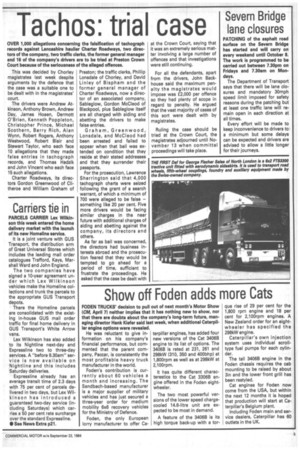Tachos: trial
Page 7

If you've noticed an error in this article please click here to report it so we can fix it.
OVER 1,000 allegations concerning the falsification of tachograph records against Lancashire haulier Charter Roadways, two directors of the company, two traffic clerks, the former general manager and 16 of the company's drivers are to be tried at Preston Crown Court because of the seriousness of the alleged offences.
This was decided by Chorley magistrates last week despite arguments by the defence that the case was a suitable one to be dealt with in the magistrates' court.
The drivers were Andrew Atkinson, Anthony Brown, Andrew Day, James Hoaen, Dermott O'Brien, Kenneth Poppleton, Christopher Prince, Michael Scothern, Barry Rich, Alan Wynn, Robert Rogers, Anthony Westwood, Robert Blair and Stewart Taylor, who each face 10 allegations that they made false entries in tachograph records, and Thomas Hadzik and John Vincent who each face 15 such allegations.
Charter Roadways, its directors Gordon Greenwood of Clitheroe and William Graham of Preston; the traffic clerks, Phillip Lonsdale of Chorley, and David Linley of Bispham and the former general manager of Charter Roadways, now a director of an associated company, Sableglow, Gordon McCleod of Blackpool, plus Sableglow itself are all charged with aiding and abetting the drivers to make false entries.
Graham, Greenwood, Lonsdale, and McCleod had been arrested and failed to appear when that bail was extended on condition that they reside at their stated addresses and that they surrender their passports.
For the prosecution, Lawrence Sherrington said that 4,000 tachograph charts were seized following the grant of a search warrant, of which a minimum of 700 were alleged to be false — something like 20 per cent. Five more drivers would be facing similar charges in the near future with additional charges of aiding and abetting against the company, its directors and others.
As far as bail was concerned, the directors had business interests abroad and the prosecution feared that they would be tempted to go ahead for a period of time, sufficient to frustrate the proceedings. He asked that the case be dealt with




























































































